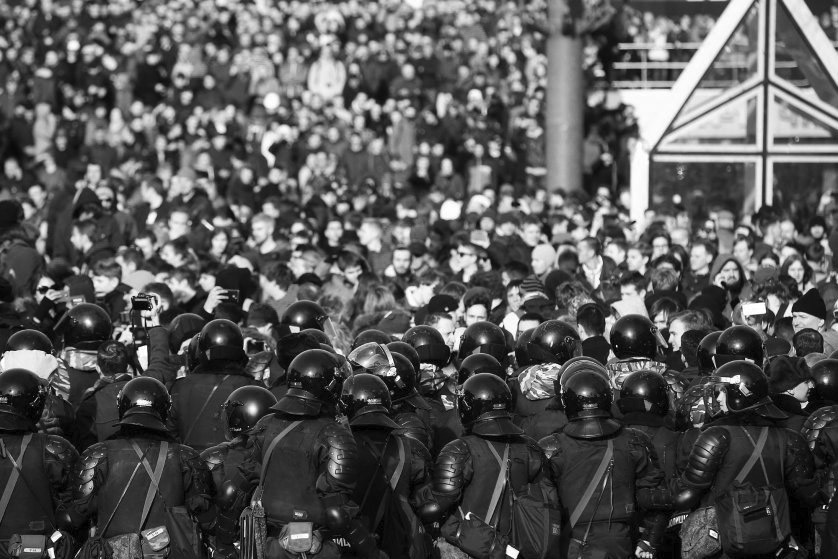What happened
On the 27th of July 2019 thousands of people took to the streets in Moscow, to express their protest against actions taken by the CEC (Central Electoral Commission of Russia) and Mosgorizbirkom (the Moscow Electoral Commission).
Earlier, these commissions invalidated thousands of signatures collected by Moscovites and rejected independent candidates' registration to participate in elections to the Moscow Duma (local legislature).
Earlier, these commissions invalidated thousands of signatures collected by Moscovites and rejected independent candidates' registration to participate in elections to the Moscow Duma (local legislature).
The authorities responded harshly to the peaceful protests. Police and the National Guard of Russia attempted to block streets, disperse crowds and conducted mass arrests, often resorting to physical violence against the protesters.
In total, ,__________________were detained that day, a record number.
In total, ,__________________were detained that day, a record number.
77 people
were injured by members of various law enforcement agencies
Within a week, on the 3rd of August, a new protest action began. This time protesters planned to walk along the Boulevard Ring in Moscow. These actions were once again met with mass arrests:
were remanded by the Ministry of Interior
101 people
152 people
were remanded in police custody
Practically all independent candidates were placed under administrative arrest following the protests. Human rights organizations, including Zona Prava (Rights Zone) and the Committee Against Torture lodged 19 complaints regarding violent actions committed by law enforcement officials. Not a single case was opened by authorities in result to these complaints.
After the protests, law enforcement officers decided not to confine themselves to administrative arrests, and opened criminal cases against participants in the peaceful non-violent action.
1373 people
| What criminal cases have been instituted? Formally speaking, eight proceedings have been started by authorities in response to the protests: the main "case 212" against public disorder under Article 212 of the Russian Criminal Code; the case against Konstantin Kotov based on the "Dadin" article 212.1 for multiple violations in organizing a protest; and six cases of violence against public officials under Article 318. |
"Case 212" concerning events of July 27th was launched by the Investigative Committee three days later. Seven men (Evgeniy Kovalenko, Kirill Zhukov, Ivan Podkopaev, Danilla Beglets, Samariddin Radzhabov, Nikita Chirtsov, Eduard Malyshevsky) are being accused of non-life threatening assault against members of the Russian National Guard on the 27th of July. Another case was started against Pavel Ustinov, for dislocating a police officer's shoulder on August 3rd, in the process of his arrest. Also, a case against Egor Zhukov under Article 318 was later changed to Article 280 - public pronouncements in support of extremism, due to four videos found on his YouTube channel.
17 people were detained as part of the «public disorder» criminal cases. But the prosecution failed to provide enough evidence of guilt of all the defendants. On the 3rd of September four were released: Sergei Abanichev, Vladislav Barabanov, Daniil Konon and Valery Kostenok. However, «Case 212» has not been discontinued yet. The article on public disorder is still being charged to the two remaining accused. They face 3 to 8 years of imprisonment and there is no guarantee that the Investigative Committee will not include new defendants in this case.
Charges under article 318 and the criminal sentences of the prisoners are absurd. Three years of imprisonment for touching police officers and the Russian National Guard members is excessive cruelty considering the far-fetched charges.
17 people were detained as part of the «public disorder» criminal cases. But the prosecution failed to provide enough evidence of guilt of all the defendants. On the 3rd of September four were released: Sergei Abanichev, Vladislav Barabanov, Daniil Konon and Valery Kostenok. However, «Case 212» has not been discontinued yet. The article on public disorder is still being charged to the two remaining accused. They face 3 to 8 years of imprisonment and there is no guarantee that the Investigative Committee will not include new defendants in this case.
Charges under article 318 and the criminal sentences of the prisoners are absurd. Three years of imprisonment for touching police officers and the Russian National Guard members is excessive cruelty considering the far-fetched charges.
Why do we think that there was no public disorder?
A situational analysis of the meaning behind public disorder and cases when it can be legitimately applied was carried out by an international and independent group of human rights experts, after the events of May 6th 2012 on Bolotnaya Square.
You can read more about this on 6maycommission.org.
You can read more about this on 6maycommission.org.
Briefly, they concluded that this Article assumes two qualifying factors:
- There must be disorder
- It should be massive
How many people were arrested and what are they accused of?
Initially 15 people stood accused of mass public disorder. Only two of them remain - Sergey Fomin and Aleksey Minaylo - the others now face accusations under Article 318 assault against members of law enforcement agencies. Two further arrestant were added to those accused under Article 318 including Nikita Chirtsov and Eduard Malyshevksy. Four of the initial fifteen were immediately released once the accusation of mass public disorder was remitted. Egor Zhukov now stands accused of extremism.
How many people were arrested and what are they accused of?
Initially 15 people stood accused of mass public disorder. Only two of them remain - Sergey Fomin and Aleksey Minaylo - the others now face accusations under Article 318 assault against members of law enforcement agencies. Two further arrestant were added to those accused under Article 318 including Nikita Chirtsov and Eduard Malyshevksy. Four of the initial fifteen were immediately released once the accusation of mass public disorder was remitted. Egor Zhukov now stands accused of extremism.
Most of those arrested had never before fell foul of the law. Among them are students of top universities, engineers, software developers. They are very much like you and us, law abiding citizens who accidentaly found themselves under the brunt force of the legal system. You can learn more about them and their cases here.
Where are all those arrested and what awaits them?
As the legal cases are built, the courts impose various sentencing to prevent the accused from fleeing or interfering with ongoing investigations. All of the accused have been remanded in custody for two months. Three of them are being held in a detention center, which is practically a jail, even if their guilt has not been established and they do not pose any danger to society. Some of their families have thus lost their only source of income.
One of the justifications for their detention has been the accusation that the defendants were disappearing from the scene of the crime - the streets where the protests took place. However, they were disappearing into police vans and police custody, swept up with the hundreds of other protesters being detained.
During criminal investigations, three of the accused have had their restrictions changed: two were moved from custody to home arrest and one had to sign a promise to not leave the country.
During criminal investigations, three of the accused have had their restrictions changed: two were moved from custody to home arrest and one had to sign a promise to not leave the country.

At the moment the prosecutors are pushing for maximum terms for the remaining accused. To recall, Article 212 threatens 3 - 8 years of imprisonment; Articles 318 and 212.1 up to 5 years. We should point out that the previous application of Article 212 during the "Bolotnaya Case" lead to sentencing well below the maximum requirement of the law.
We are battling for the total cessation of the public disorder case. We believe that it is impossible to accuse people of that, which did not take place.
What else happened, besides the criminal cases?
The majority of candidates who were refused registration to ballot in the Moscow Duma elections were also arrested.
The Investigative Committee identified 134 men to clarify their military service status (which is obligatory for all Russian men between 18-27 years old), and a military committee began contacting them for updates to their registration details and profile. These notices were also sent out to women, who by law should not serve in the army. In fact, the state used military service as a means of manipulation
The Federal Service of Bailiffs found a debt of detainees for a total of about 25 million rubles (approx. 390 000 USD) and organized raids on their apartments.
«Moscow Metro», «M. Taxi» and the restaurant «Armenia» filed lawsuits against unregistered candidates for a total amount of 14 million rubles (220 000 USD) for damage allegedly caused to their companies by protesters during the demonstrations.
The Prosecutor's Office demanded to deprive parental rights from Prokazovy and Chomsky families who took their children to the rally. The Investigative Committee opened a criminal case against them on the charge of leaving the child in danger (Article 125 of the Russian Criminal Code) and failure to fulfill their educational duties (Article 156 of the Russian Criminal Code). On the 2nd of September the court rejected both claims and did not deprive these families of their parental rights. But on the 18th of September the prosecutor appealed this decision
The Investigative Committee identified 134 men to clarify their military service status (which is obligatory for all Russian men between 18-27 years old), and a military committee began contacting them for updates to their registration details and profile. These notices were also sent out to women, who by law should not serve in the army. In fact, the state used military service as a means of manipulation
The Federal Service of Bailiffs found a debt of detainees for a total of about 25 million rubles (approx. 390 000 USD) and organized raids on their apartments.
«Moscow Metro», «M. Taxi» and the restaurant «Armenia» filed lawsuits against unregistered candidates for a total amount of 14 million rubles (220 000 USD) for damage allegedly caused to their companies by protesters during the demonstrations.
The Prosecutor's Office demanded to deprive parental rights from Prokazovy and Chomsky families who took their children to the rally. The Investigative Committee opened a criminal case against them on the charge of leaving the child in danger (Article 125 of the Russian Criminal Code) and failure to fulfill their educational duties (Article 156 of the Russian Criminal Code). On the 2nd of September the court rejected both claims and did not deprive these families of their parental rights. But on the 18th of September the prosecutor appealed this decision
Our support for the 212 prisoners and their families would be impossible without friends:
Team 29, MHG, OVD Info, Pravozaschita Otkrytki, Sakharov Centr, ZATEXT
Team 29, MHG, OVD Info, Pravozaschita Otkrytki, Sakharov Centr, ZATEXT







